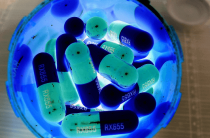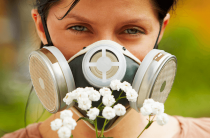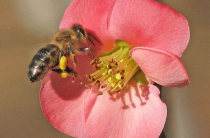Today, every fifth inhabitant of the earth suffers from allergies. Since the 70s of the last century, each subsequent decade has increased several times the number of patients with allergies.
This unfavorable trend takes place in the modern world, since a sharp jump in industrial development leads to environmental pollution, which negatively affects the immune system, in particular. He also contributes:
- frequent use of various medicines (such as tablets, capsules, drugs produced in other forms) inappropriately;
- the presence in food of preservatives, flavor enhancers, stabilizers and other foreign substances;
- wearing synthetic fabrics.
All this together is a provoking factor for the development of allergies.
What is an allergy?
Allergy is an inadequate reaction of the body to the ingestion of allergens. They are not harmful to the human body, however, they are perceived as hostile by impaired immunity. Pregnancy, being a stressful situation for the body, can provoke both the appearance of an allergy during pregnancy and the exacerbation of its various symptoms. Also a big disorder is the fact that allergy is a hereditary disease, in which the risk of its transmission by inheritance from the mother is 30-40%.
Stages of allergy development
- The first stage begins from the moment the allergen enters the body. Different allergens have different routes of entry into the body. So, plant pollen enters through the respiratory tract, animal hair through contact with the skin, food containing allergens is absorbed through the gastrointestinal tract. At the first stage, the substance that causes allergies enters the circulatory system and comes into contact with antibodies. This complex affects certain cells that are in the connective tissue.
- Second phase. When the allergen comes into contact with the immune system again, the membrane of cells containing allergy triggers (histamine, eiconazoids, cytokines, etc.) opens. Getting into the blood, these factors provoke the development of allergic reactions, affecting the metabolism of cells of various tissues of our body.
- The third stage is the direct influence of substances that provoke allergies. When they act on other cells, tissue edema develops (nasopharynx, larynx), bronchospasm (with anaphylactic shock and Quincke's edema), serous fluid secretion (allergic rhinitis).
Clinical manifestations of allergies
And so, the course of allergic reactions, based on the general symptom-complexes, can be divided into several groups, according to the clinical course of the disease:
- allergic rhinitis. The patient develops nasal congestion caused by the expansion of blood vessels located in the nasopharynx, which leads to difficulty breathing. Also from the nasal cavity there is an abundant release of fluid, which is almost impossible to stop. All this is accompanied by sneezing and sore throat. Allergic rhinitis is most characteristic of an allergy to dust or flowering plants, although it can also develop in the course of, for example, food allergies.
- Allergic conjunctivitis. This symptom complex is a classic clinical manifestation of conjunctivitis. The difference is that ordinary conjunctivitis is caused by infectious influences, and with allergies, it is provoked by substances that mediate the immune response.
- Local urticaria. This development of an allergy can occur both immediately after the ingestion of a substance that causes an allergy, and after a few days. It is characterized by skin manifestations concentrated in certain places, which are expressed in the form of blisters, changes in skin color, itching and burning sensations.
- Massive urticaria is a cutaneous manifestation of localized urticaria that occurs over the entire skin.
- Quincke's edema is a condition in which there is swelling of various connective tissues and mucous membranes. The greatest danger is swelling of the larynx with Quincke's edema, since this significantly complicates breathing. In order to prevent a fatal outcome, it is urgent to take measures of specialized medical care.
- Anaphylaxis is another potentially dangerous condition of allergic reactions. There is a sharp decrease in pressure, urticaria immediately appears throughout the body, swelling of the larynx can lead to fatal consequences. The development of symptoms of anaphylaxis is usually observed within the first minutes after contact with the allergen. Anaphylactic shock requires urgent medical attention.
Allergies during pregnancy worsen the general condition of the mother, severe attacks of anaphylactic shock or angioedema can significantly harm the unborn child. In addition, medications that are used to relieve allergy symptoms in the mother can directly affect the child's condition.
Allergy treatment during pregnancy
And so, let's start with the fact that during pregnancy, severe allergic conditions are primarily stopped, since with such a development of allergy symptoms, the risk from the action of drugs is much lower than the risk of death from acute manifestations of allergies left without therapy. Naturally, in this condition, it is necessary to avoid contact with the allergen in every possible way, especially with a tendency to develop severe manifestations of this disease.
allergy pills during pregnancy
Many antihistamines have a pronounced effect on the fetus and are able to penetrate the placenta, as well as with breast milk into the child's body. For this reason, the choice of such drugs in various forms (drops, tablets, also in the form of drugs for injection) occurs with great care. Without fail, they must be safe for the health of the unborn child.
A popular antihistamine, demidrol, is not used in late pregnancy because it has a stimulating effect on uterine contractions, which can cause miscarriage. Terfenadine tablets adversely affect the fetus, as a result of which the child may be born prematurely. It is also recommended that pregnant and lactating women refrain from using piperacillin. Most antihistamines that are effective in relieving allergy symptoms are only recommended if the benefit to the health of the mother and unborn child outweighs the risk of negative side effects. Tablets or drops of Cytirizine can be used in the 2nd and 3rd trimester of pregnancy, due to the peculiarities of the drug.
There are conditions in which antihistamines are simply necessary, despite the risk to the fetus. Each such case is assessed individually by a competent specialist, based on the most complete information about the health of the mother and child.
A woman during pregnancy needs to be even more attentive to her health. So, a pregnant woman must necessarily know the symptoms of this disease and consult a doctor at the first appearance. As a result of the increased need for barrier protection against contact with the allergen for a pregnant woman, an accurate determination of the allergen during pregnancy is necessary. This is done using special test kits containing allergens that are injected under the skin. Then, for several days, it is necessary to monitor reactions on the skin, since allergy symptoms may not develop immediately.
Prevention of allergies in pregnant women
Given the prevalence of allergies in the modern world, even a healthy woman has the risk of giving birth to a child who later becomes allergic. First of all, it is necessary to follow a special hypoallergenic diet.
This diet is based on the fact that a number of foods (tomatoes, honey, citrus fruits, strawberries, raspberries, shellfish, highly fermented cheeses) can trigger the development of allergy symptoms. To do this, these products do not have to be allergens in themselves. They contain substances that stimulate the body's immune system to the occurrence of allergic reactions. So, for example, chocolate and aged cheese contain a large amount of histamine, which in the human body is the main factor for the development of allergies.
It is better to refrain from these products for mothers with already existing allergic diseases. Mothers who do not suffer from them can use these products, but it is advisable not to do this every day and to observe a reasonable measure when using them.
In general, the nutrition of a pregnant woman should consist of quality products, of natural origin. Refrain from eating marinades, smoked foods, and any other unnatural foods. Rabbit meat deserves a separate word as the most hypoallergenic dietary meat. Naturally, the use of alcohol and tobacco is unacceptable, especially during pregnancy.
Mothers are advised to adhere to a strict diet when feeding, since many unwanted substances can enter the baby's body through breast milk.
Feeding the baby should be done only with breast milk. Many women today abstain from breastfeeding for aesthetic reasons, which is unacceptable. Breast milk is a product specially created by nature for full growth and development. It has an optimal fat content and amino acid composition, and is also rich in vitamins, minerals and factors for the formation of immunity. Babies raised on breast milk are uncommonly healthier than their peers who were fed formula. Powdered formulas are by no means products of choice over breast milk and are used only when needed.
Mothers need to limit the use of cosmetics and non-natural hygiene products (powders, air fresheners, fabric softeners). The substances included in these products of the chemical industry are alien to the human body, which implies the risk of allergies in the fetus.
And of course, do not forget about the old saying about the treatment of allergies: “no contact with the allergen - no allergy!”.
It should be emphasized especially the role of stress in the formation of allergic reactions. Stress causes inhibition of the normal functioning of the immune system, as a result of which it malfunctions, which are precisely expressed in the form of an allergy. A pregnant woman needs to completely protect herself from stress of any nature.
Remember that only your doctor has the right to diagnose and treat allergies. Self-medication, especially during pregnancy, is unacceptable.















